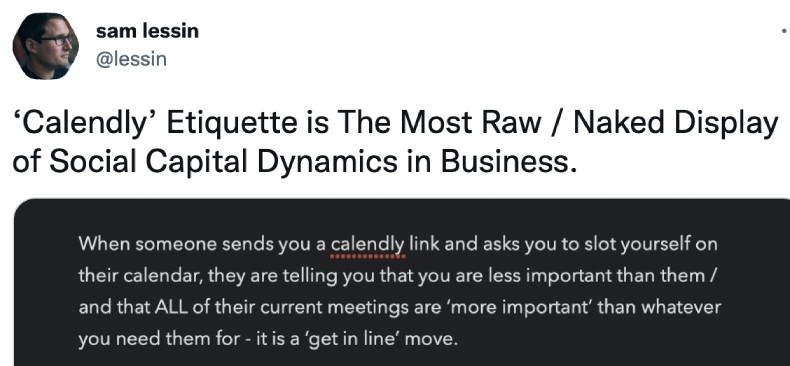
Facebook’s former VP Sam Lessin (now a partner at the venture capital firm Slow Ventures) recently posited that the use of the online appointment scheduling tool Calendly was “The Most Raw / Naked Display of Social Capital Dynamics in Business”.
Understandably, the entire world chimed in, for and against the notion, particularly because it was previously assumed that Calendly was a benign, time-saving tool.
For the uninitiated (considering it is not a tool all that popular in India), what happens with Calendly is this: you, the Calendly user, are a master of your own time. You mark all your meetings in the Calendly calendar (you can add details of what the meeting is about that you can make public or hide them and let it only be shown as ‘busy’). This is the public version of your ‘time’ for the foreseeable future. Now, when you want to set up a new meeting with someone, you simply send your Calendly shared calendar to them, and they pick whichever timeslot works for them from the available free slots in your calendar.
On paper, that sounds incredibly more efficient than,
‘Could we talk?’
‘Sure, when?’
‘Today 5 pm?’
‘Have another call. 6 pm?’
‘Nah, I’m busy at 6. Tomorrow 10 am?’
‘I have a 10-11. 12 noon? Or 2 pm? Or, 3:30 pm?’
‘3:30 pm works. Thanks. Will send an invite.’
If this was on email or WhatsApp (assuming some time taken before reading and responding to each sentence sent), then this itself could constitute a ‘talk’ 🙂
On Twitter, Sam’s post literally exploded, with—from what I noticed—more support ‘against’ than ‘for’. The larger argument was around efficiency, in the assumption that the Calendly method is the only (currently available) way to solve for the back-and-forth and is simply more efficient.
But there is also a kernel of truth in Sam’s argument and it is based on who wants the meeting/call more between the 2 people involved. The power dynamic does matter to some extent – it is entirely up to the other person (the so-called ‘less important’ person of the 2) to overlook/ignore it (along with his/her ego) and prioritize efficiency.
Broadly speaking, a Calendly link is not very different from the way we pick seats in a flight or a cinema theater – we look at all the seats available, the ones that are taken already, the ones available… then consider our priorities (do we want aisle seat? Or a window seat? Front of the plane/theater?) and based on that we pick our seats.
In the case of a plane or a theater, the brands market the services via broadcast to lure us in and get our interest. Once we are sold, we come to their platform to pick the seats we want from the ones that are available. So when we pick, we want it more than the platform. How often have you settled for a middle seat in a flight because you absolutely should be on that particular flight? Your need is more pressing in this case than the need for the airlines to woo you at this step too with some more offers or options.
And I reckon this is perhaps what goes in some people’s heads when they come across a Calendly link – that you are the end-user and the Calendly sender is a theater/plane who is asking you to get in line since there are many like you.
Again, how essential is it for you to have a call with the Calendly sender? Would you lose something (not money… more like opportunity, connections, etc.) if you are not able to get that call? Is it the same for the other person? Can they continue living normally without your call?
If your need is more pressing, you can choose to overlook the other person not caring for your call as much as you do and just figure out how to get that call going.
On the other hand, if you are someone pitching an idea to get funds for your venture, you are in a specific need. People with the money need to see their interest in investing their money as an equally important need to see your open Calendly invite and fit themselves into that slot. That’s like you hawking your idea at a tent in the town square and a queue outside manifesting itself to get in one by one.
I do agree with a lot of comments online that said that Sam is severely overthinking this Calendly thing with his ideas around power imbalance. Yes, power imbalance exists in almost every sphere of our lives including work and calendar scheduling. But do we need to be absolutists about it indicating that we would never open a Calendly link?
That too depends on a position of privilege 🙂 If you can afford to not open any Calendly link from anyone, you would stay away and talk about it. If you do need things from others from time to time, you’d simply move on by accepting the fact that in many things in our lives we need stuff from others even as they don’t need to talk to us at all.
For instance, besides the POTUS (that Sam mentions that he’s open to opening the Calendly link from), I’m reasonably sure he’d open Calendly links from the following: his spouse (assume that there may be some circumstance!), his children (again, some circumstances!), his tax/finance consultant who may be working with more clients, his investment banker… and so on.
The best outcome of this debate was for Calendly, ironically!
Calendly CEO Tope Awotona tweeted that Sam’s perspective led to a huge spike in signups! 🙂
